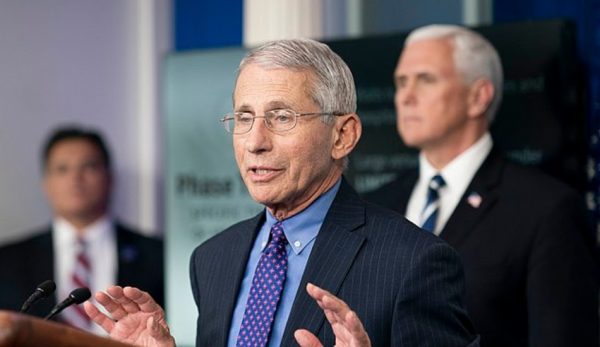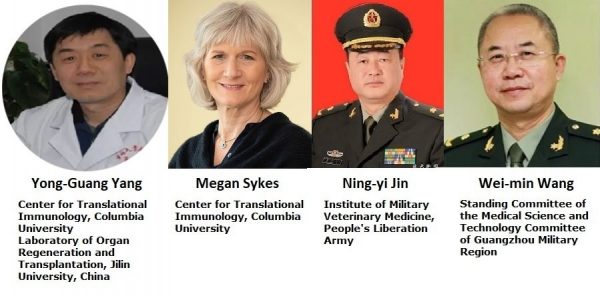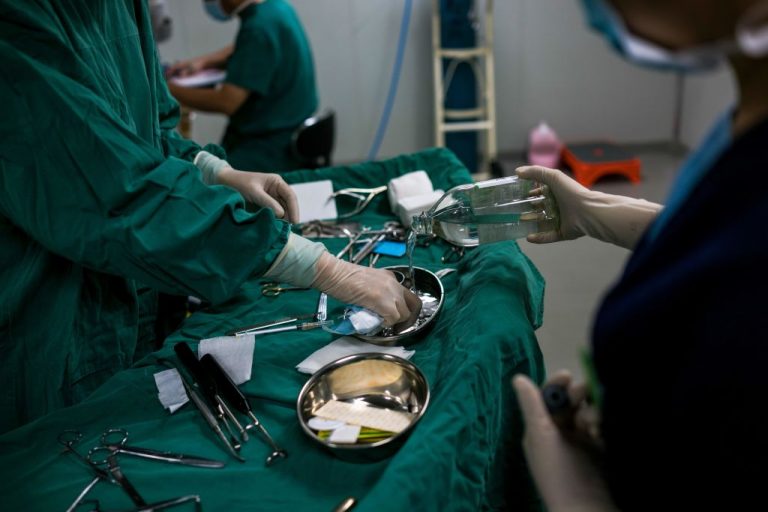News analysis
Details have emerged surrounding funds provided to Chinese military scientists by the U.S. National Institute of Health (NIH), raising questions about the former’s connections to a Chinese People’s Liberation Army (PLA)-affiliated hospital suspected of complicity in forced organ harvesting from prisoners of conscience.
Learn more:
China: UN human rights experts alarmed by ‘organ harvesting’ allegations
The Gateway Pundit reported that one of the hospitals accused of being involved in organ trade practices was studied in a scientific paper published on Oct. 21. The study was conducted by researcher Megan Sykes from Columbia University in New York and Yong-Guang Yang, who listed his affiliations as Columbia University and the Laboratory of Organ Regeneration and Transplantation at the First Hospital of Jilin University in China.
The study focused on the Jilin University First Hospital, located in the province of the same name in Northeast China. The hospital was previously known as the Affiliated Hospital of the First Military Medical University of the Chinese People’s Liberation Army (PLA) in Changchun when it was renamed in 2000.
The Jilin University First hospital has garnered the attention of global activists after the Chinese government opened an investigation into the hospital’s president Wang Guanjun on Aug. 3. The Chinese Communist Party’s (CCP) Central Commission of Discipline stated that Wang was under investigation for “serious violations of discipline and law.”
Success
You are now signed up for our newsletter
Success
Check your email to complete sign up
According to state-run media Beijing Youth Daily, besides Wang, at least 12 high-ranking staff from medical universities were being investigated by the government. One third of them had a background in medicine.
Chinese state- and military-run hospitals across the country have been implicated in forced organ harvesting carried out under the auspices of the Chinese Communist Party (CCP). Human rights investigators believe that the vast majority of victims — who are murdered for the highly profitable transplant operations — are religious or political prisoners.
US-China links
The paper reported that the dozen investigations were part of an ongoing anti-corruption campaign sweeping through the nation and would target individuals in the medical field as well as throughout its governmental bodies.
However, the scientific study for First Hospital was funded by the National Institute of Allergy and Infectious Diseases (NIAID) headed by Dr. Anthony Fauci, as well as the National Institutes of Health (NIH)’s Shared instrumentation grant for the CCTI Flow Cytometry Core.
The NIH’s official website reports that between 2006 and 2018, Yong-Guang Yang received $6.6 million in NIH funding, most of which came from Fauci’s NIAID.

According to his publication records, Yong-Guang Yang officially began working with the First Hospital in 2010, supported by research grants from Fauci’s NIAID (grant: AI064569) and Megan Sykes (AI045897).
These findings allude to the concerning fact that established and well-known healthcare professionals such as Dr. Fauci may have been aware of the CCP’s organ harvesting practices and yet continue to fund or even turn a blind eye to these crimes.
It also represents the culmination of the thousands of Chinese scientists who arrive in the U.S. each year. These leading experts in their field seek access to American knowledge, acquiring skills in science and medicine. They thereby gain access to technology and funding all the while continuing to maintain an allegiance to the Chinese Communist Party.
According to the Gateway Pundit’s report, in 2011, Yong-Guang Yang worked with Chunfeng Wang of Jilin University on a study also funded by Fauci’s NIAID. Wang, a collaborator with the PLA’s Institute of Military Veterinary Medicine, worked out of a center reportedly connected to China’s biowarfare program.
Utilizing NIH funding in 2012, Yang began training Chinese scientists from The First Hospital of Jilin University at his laboratory in Columbia University, publishing a study in February, 2012.
In 2018, Yang also conducted a scientific study with the PLA funded by NIH grants AI079087 and HL130724, resulting in a research paper published in February, 2018.
By 2019, Yang had become an official member of the Laboratory of Organ Regeneration and Transplantation at The First Hospital of Jilin University, as well as in the International Center of Future Science and at China’s National Joint Engineering Laboratory of Animal Models for Human Diseases. All the while, he maintained his affiliation with Columbia University and research published in the U.S.
Most recently, Yang became a scientific advisor to the Jilin Zhongke Bio-Engineering Co. Ltd in Changchun, alongside Jin Ningyi. The company is listed as a biotechnology corporation focused on organ transplantation and regeneration.
Jin is a general with the PLA and head of the latter’s current Institute of Military Veterinary Medicine. Another of Jilin Zhongke’s scientific advisors is Maj. Gen. Wang Weimin from the Standing Committee of Medical Science and Technology Committee, a branch of what was then the PLA’s Guangzhou Military Region.

The Chinese authorities have made various attempts to explain the country’s transplant industry as international scrutiny grows. One issue commonly cited by human rights experts are the very short wait times for Chinese organs; transplants can be veritably scheduled as compared with Western countries, where patients often wait years to receive an organ donation.
According to Beijing, the short wait times are explained by the size of the Chinese population, as well as increasing acceptance of organ donation. However, research into China’s official organ donor network reveals falsified data generated by a preset equation.
Earlier this month, Chinese officials in the central province of Henan released the availability and sale of human organs on a public website, causing a stir amongst activists in China and the global community.
Read More:
Chinese Officials Advertise Human Organs on Public Website, Raising Scrutiny About Transplant Abuse
In 2006 and 2007, Canadian Member of Parliament David Kilgour and human rights lawyer David Matas published an investigative report into the allegations of live organ harvesting conducted illegally on prisoners of conscience across China.
While medical technology made it possible to conduct efficient organ transplants from executed prisoners in the 1990s, the CCP’s organ harvesting industry took off directly following the persecution of Falun Gong — a popular Chinese spiritual practice — in 1999. State publications boasted of tens of thousands of transplants conducted each year beginning in the early 2000s.
Allegations of the CCP’s forced organ harvesting were first raised in 2006. Today, the practice is believed to continue unabated, with a major victim group being imprisoned Muslim minorities in northwestern China.














